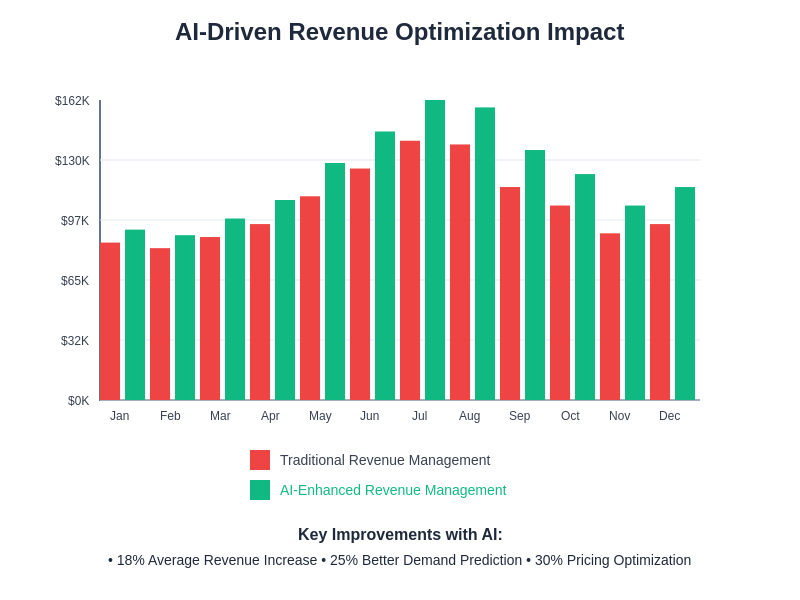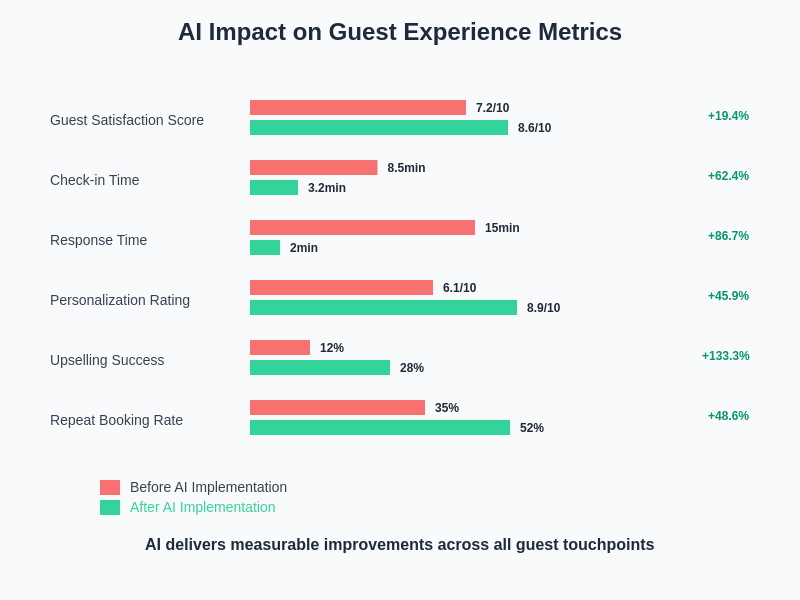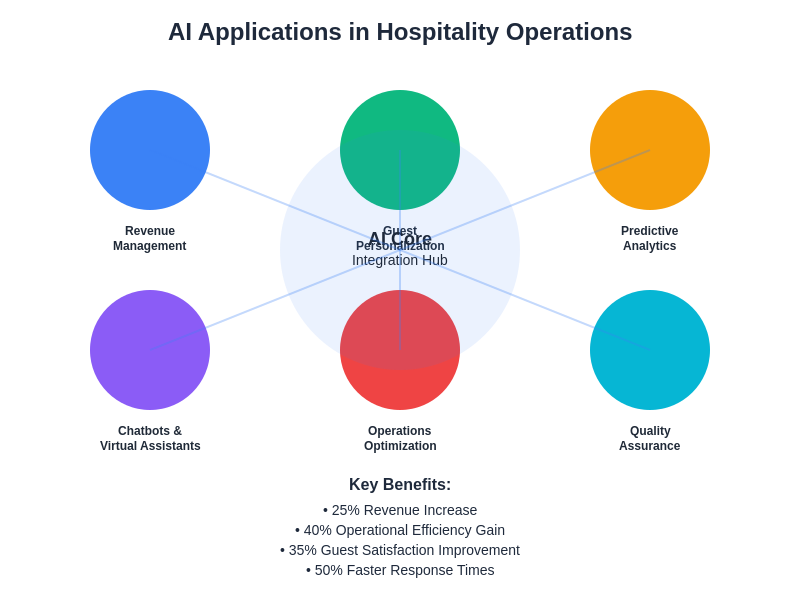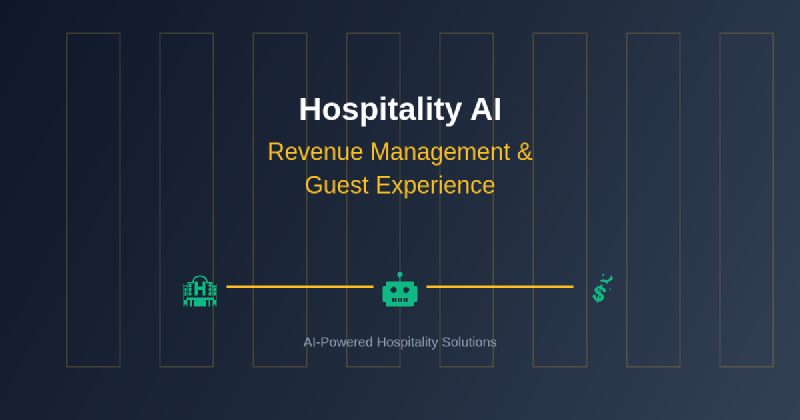The hospitality industry stands at the precipice of a technological revolution where artificial intelligence has emerged as the driving force behind unprecedented improvements in revenue optimization and guest satisfaction. This transformation represents far more than simple automation; it embodies a fundamental shift toward intelligent, data-driven decision making that enhances every aspect of the hospitality experience from initial booking through post-stay engagement. Hotels, restaurants, and travel companies worldwide are discovering that AI-powered solutions not only streamline operations but also create deeply personalized experiences that foster customer loyalty and drive sustainable revenue growth.
Explore the latest AI innovations in hospitality to stay informed about cutting-edge technologies that are reshaping guest expectations and industry standards. The convergence of artificial intelligence with hospitality operations has created opportunities for businesses to achieve operational excellence while delivering exceptional guest experiences that were previously impossible to scale effectively.
The Evolution of Revenue Management Through AI
Traditional revenue management in hospitality relied heavily on historical data analysis, seasonal patterns, and manual price adjustments that often failed to capture the dynamic nature of market demand. The introduction of artificial intelligence has revolutionized this approach by enabling real-time analysis of countless variables including competitor pricing, local events, weather patterns, guest booking behaviors, and market sentiment data. This comprehensive analytical capability allows hospitality businesses to implement dynamic pricing strategies that maximize revenue while maintaining competitive positioning in increasingly saturated markets.
Modern AI-driven revenue management systems process vast amounts of data from multiple sources to identify optimal pricing opportunities that human analysts might overlook. These systems continuously monitor market conditions, analyze booking patterns, and adjust prices in real-time to capture maximum revenue during high-demand periods while ensuring occupancy rates remain optimal during slower periods. The result is a more sophisticated approach to revenue optimization that adapts instantly to changing market conditions and guest preferences.
The predictive capabilities of AI have transformed revenue forecasting from educated guesswork into precise science. Machine learning algorithms analyze historical booking data, seasonal trends, local event calendars, and external factors to predict demand with remarkable accuracy. This enhanced forecasting capability enables hospitality businesses to make informed decisions about staffing levels, inventory management, and marketing campaigns while optimizing room rates and package offerings to maximize profitability.

The quantitative impact of AI-driven revenue management demonstrates consistent improvements across all operational periods, with particularly significant gains during peak demand seasons where dynamic pricing algorithms can capitalize on market opportunities while maintaining competitive positioning. These improvements translate directly to bottom-line profitability while enhancing market responsiveness.
Personalizing Guest Experiences at Scale
The modern hospitality landscape demands personalized experiences that cater to individual guest preferences while maintaining operational efficiency across large-scale operations. Artificial intelligence has made it possible to deliver truly personalized experiences by analyzing guest data, preferences, and behavioral patterns to create customized recommendations and services. This level of personalization extends from pre-arrival communication through post-stay follow-up, creating a comprehensive guest journey that feels individually crafted while being systematically scalable.
Enhance your hospitality operations with Claude AI to leverage advanced reasoning capabilities for guest service optimization and operational decision-making. AI-powered personalization systems analyze guest profiles, previous stay history, demographic data, and real-time preferences to create tailored experiences that exceed expectations while driving incremental revenue through targeted upselling and cross-selling opportunities.
The implementation of AI-driven personalization has enabled hospitality businesses to move beyond generic service offerings toward dynamic, preference-based experiences that adapt to individual guest needs. Whether recommending dining options based on dietary preferences, suggesting activities aligned with personal interests, or customizing room amenities according to previous stays, AI systems create meaningful connections between guests and hospitality brands that foster long-term loyalty and repeat business.
Optimizing Operational Efficiency Through Intelligent Automation
Operational efficiency represents a critical success factor in hospitality where labor costs, service quality, and guest satisfaction must be carefully balanced to maintain profitability. Artificial intelligence has introduced unprecedented opportunities for optimizing operations through intelligent automation that reduces manual workload while improving service consistency and response times. From automated check-in processes to predictive maintenance systems, AI-powered solutions are streamlining operations while enabling staff to focus on high-value guest interactions that require human touch and expertise.
Inventory management has been transformed through AI systems that predict consumption patterns, optimize purchasing decisions, and reduce waste while ensuring adequate stock levels for peak demand periods. These systems analyze historical consumption data, seasonal patterns, occupancy forecasts, and special event schedules to generate precise inventory requirements that minimize costs while preventing stockouts that could impact guest satisfaction.
Staffing optimization represents another area where AI has delivered significant operational improvements. Machine learning algorithms analyze historical occupancy patterns, seasonal trends, and special events to predict staffing requirements across different departments and time periods. This predictive capability enables hospitality businesses to optimize labor costs while ensuring adequate service levels during high-demand periods, creating more efficient operations that maintain service quality while controlling expenses.
Enhancing Customer Service Through AI-Powered Solutions
The integration of artificial intelligence into customer service operations has created new possibilities for delivering responsive, consistent, and personalized support that operates around the clock. AI-powered chatbots and virtual assistants can handle routine inquiries, process simple requests, and provide instant responses to common questions while seamlessly escalating complex issues to human representatives when necessary. This hybrid approach ensures that guests receive immediate assistance while allowing human staff to focus on complex problem-solving and relationship-building activities.
Natural language processing capabilities enable AI systems to understand and respond to guest communications in multiple languages, breaking down communication barriers that previously limited service accessibility for international travelers. These systems can interpret guest intent, provide relevant information, and even detect sentiment to identify guests who may require additional attention or escalation to management teams.

The measurable improvements in guest experience metrics demonstrate the transformative power of AI implementation across all service touchpoints. These enhancements create a compounding effect where improved guest satisfaction leads to increased loyalty, positive reviews, and higher lifetime customer value, establishing a sustainable competitive advantage in the hospitality marketplace.
The predictive analytics capabilities of AI customer service systems enable proactive outreach to guests who may be experiencing issues or who might benefit from additional services. By analyzing guest behavior patterns, feedback data, and service interaction history, these systems can identify opportunities to enhance the guest experience before problems arise, creating a more seamless and satisfying hospitality experience.
Data-Driven Decision Making and Business Intelligence
The hospitality industry generates enormous amounts of data from guest interactions, booking systems, operational processes, and market activities. Artificial intelligence has transformed this data wealth into actionable business intelligence that drives strategic decision-making across all aspects of hospitality operations. Advanced analytics platforms process complex datasets to identify trends, opportunities, and potential challenges that inform everything from marketing strategies to operational improvements and investment decisions.
Predictive analytics enable hospitality businesses to anticipate market changes, guest preferences, and operational requirements with unprecedented accuracy. These insights inform strategic planning processes, marketing campaign development, and operational optimization initiatives that improve business performance while enhancing guest satisfaction. The ability to make data-driven decisions based on comprehensive analysis rather than intuition or limited historical data has become a significant competitive advantage in the hospitality industry.
Leverage Perplexity AI for comprehensive hospitality research to gather market intelligence and competitive analysis that informs strategic decision-making and operational optimization. The integration of multiple AI-powered tools creates a comprehensive business intelligence ecosystem that supports informed decision-making across all organizational levels.
Marketing Automation and Guest Acquisition
The digital marketing landscape for hospitality businesses has become increasingly complex with multiple channels, diverse audience segments, and sophisticated competition for guest attention. Artificial intelligence has revolutionized hospitality marketing by enabling automated campaign optimization, personalized messaging, and predictive audience targeting that significantly improves marketing effectiveness and return on investment.
AI-powered marketing platforms analyze guest data, booking patterns, and engagement metrics to identify high-value audience segments and create personalized marketing campaigns that resonate with specific guest preferences and behaviors. These systems can automatically adjust messaging, timing, and channel selection to optimize campaign performance while reducing manual marketing management requirements.
Dynamic pricing integration with marketing campaigns ensures that promotional offers and pricing strategies align with revenue management objectives while maintaining competitive positioning. AI systems can automatically adjust promotional pricing based on demand forecasts, competitor analysis, and inventory levels to maximize both occupancy and revenue while supporting marketing campaign effectiveness.
Quality Assurance and Performance Monitoring
Maintaining consistent service quality across multiple locations and service touchpoints represents a significant challenge for hospitality businesses operating at scale. Artificial intelligence has introduced sophisticated quality assurance capabilities that monitor service delivery, identify performance gaps, and provide actionable insights for continuous improvement initiatives.
AI-powered sentiment analysis systems process guest reviews, social media mentions, and feedback data to identify service quality trends and potential issues before they impact broader guest satisfaction. These systems can automatically categorize feedback, identify recurring themes, and alert management teams to emerging concerns that require immediate attention or systematic improvements.
Performance monitoring systems analyze operational data, guest satisfaction metrics, and financial performance indicators to provide comprehensive dashboards that enable real-time management decision-making. These systems can identify correlations between operational activities and guest satisfaction outcomes, enabling targeted improvements that enhance both service quality and business performance.
Revenue Optimization Through Dynamic Pricing
The implementation of dynamic pricing strategies powered by artificial intelligence has fundamentally changed how hospitality businesses approach revenue optimization. Unlike traditional pricing models that relied on seasonal adjustments and competitor matching, AI-driven dynamic pricing systems consider hundreds of variables simultaneously to determine optimal pricing strategies that maximize revenue while maintaining market competitiveness.
Machine learning algorithms analyze historical booking data, competitor pricing, local events, weather patterns, and economic indicators to predict demand and adjust pricing in real-time. This sophisticated approach to pricing optimization ensures that hospitality businesses capture maximum revenue during high-demand periods while maintaining occupancy during slower periods through strategic price adjustments.
The granular analysis capabilities of AI pricing systems enable hospitality businesses to optimize pricing not just for rooms but for all ancillary services including dining, spa treatments, activities, and packages. This comprehensive approach to revenue optimization creates multiple opportunities for revenue enhancement while providing guests with appropriately priced service options that match their preferences and budgets.
Guest Loyalty and Retention Strategies
Building long-term guest relationships and fostering repeat business represents a critical success factor for sustainable hospitality operations. Artificial intelligence has enhanced loyalty program effectiveness by enabling personalized rewards, predictive engagement, and targeted retention campaigns that significantly improve guest lifetime value and repeat booking rates.
AI-powered loyalty systems analyze guest behavior patterns, spending habits, and engagement preferences to create personalized rewards and experiences that resonate with individual guests while encouraging continued brand loyalty. These systems can automatically adjust reward offerings based on guest value, preferences, and engagement history to maximize the effectiveness of loyalty investments.
Predictive analytics identify guests who may be at risk of churning based on booking patterns, engagement levels, and satisfaction indicators. This early warning capability enables proactive retention campaigns and personalized outreach that can prevent guest attrition while demonstrating the brand’s commitment to guest satisfaction and relationship building.
Sustainability and Environmental Impact Optimization
Environmental sustainability has become increasingly important for hospitality businesses as guests become more environmentally conscious and regulatory requirements evolve. Artificial intelligence has enabled sophisticated sustainability optimization through smart resource management, waste reduction, and energy efficiency improvements that reduce environmental impact while controlling operational costs.
AI-powered energy management systems analyze occupancy patterns, weather conditions, and guest preferences to optimize heating, cooling, and lighting systems for maximum efficiency while maintaining guest comfort. These systems can automatically adjust environmental controls based on real-time occupancy data and guest preferences to minimize energy consumption without compromising service quality.
Waste reduction initiatives powered by AI analyze consumption patterns, guest behavior, and operational data to identify opportunities for reducing waste while maintaining service standards. These systems can optimize food ordering, amenity stocking, and supply management to minimize waste generation while ensuring adequate resources for guest needs.
Future Implications and Industry Transformation
The continued advancement of artificial intelligence capabilities promises even more sophisticated applications in hospitality operations, guest experience enhancement, and revenue optimization. Emerging technologies including computer vision, advanced natural language processing, and predictive analytics will enable new levels of personalization and operational efficiency that further transform the hospitality landscape.
The integration of AI with Internet of Things devices, mobile technologies, and emerging communication platforms will create seamless, connected experiences that span the entire guest journey from initial research through post-stay engagement. These technological convergences will enable hospitality businesses to anticipate guest needs, provide proactive service, and create memorable experiences that drive long-term loyalty and business success.

The comprehensive integration of AI across all hospitality operations creates a synergistic ecosystem where each application enhances the effectiveness of others. This interconnected approach ensures that investments in AI technology deliver maximum returns through improved operational efficiency, enhanced guest satisfaction, and optimized revenue generation across all business segments.
The democratization of AI technology will enable smaller hospitality businesses to access sophisticated capabilities that were previously available only to large hotel chains and resort operators. This leveling of the technological playing field will intensify competition while creating opportunities for innovative service delivery and unique guest experiences that differentiate brands in crowded markets.
The future of hospitality lies in the intelligent integration of artificial intelligence with human expertise to create experiences that combine technological efficiency with genuine hospitality warmth. Success will depend on finding the optimal balance between automation and human touch, ensuring that technology enhances rather than replaces the personal connections that define exceptional hospitality experiences.
Disclaimer
This article is for informational purposes only and does not constitute professional advice. The views expressed are based on current understanding of AI technologies and their applications in the hospitality industry. Readers should conduct their own research and consider their specific business requirements when implementing AI-powered hospitality solutions. The effectiveness of AI applications may vary depending on specific use cases, operational contexts, and implementation approaches.
